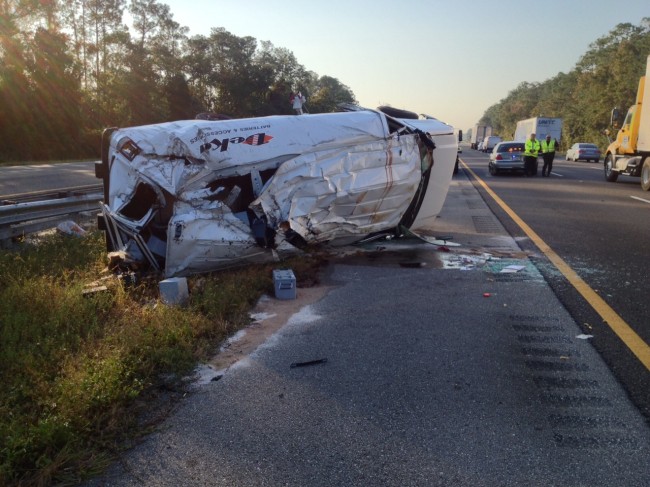
Last Updated: 11 a.m.
A van transporting some 75 vehicle batteries and traveling north on I-95, just north of State Road 100 in Palm Coast, lost control from a tire blow-out and overturned into the southbound lanes, spilling batteries, acid and candy.
The driver, Arthur Richards, 61, of Sanford, was flown to Halifax hospital with traumatic injuries to the chest.
One lane on I-95 was closed after 8 a.m. and remains closed as a team from the state Department of Environmental Protection was due to assess what’s been categorized as a hazardous spill. The closure caused a back-up of about a mile. The lane was re-opened at 10 a.m. for an hour, but was closed again at 11 a.m. for crew members’ safety.
Richards was traveling north on the outside lane at around 7:45 a.m. He was not speeding, nor was he attempting a lane change, a Florida Highway Patrol investigator at the scene said. A witness saw a rear-right tire lose its tread, at which point the van began to spin counter clockwise. Reynolds could not control it. The van then slammed against the center guardrail and tipped over it. The 75 batteries weighed down the van with an additional 2,000 pounds or so. The van ended up on its roof, facing southwest, and straddling the emergency and inside lanes.
A gash punctured the van in its rear, where the vehicle had struck the guard rail. Numerous batteries spilled out of the van–and spilled their acid–as did a quantity of candy (it is the morning after Halloween) and paperwork.
Flagler County Fire Rescue personnel at the scene warned of battery acid and fumes extending several yards from the scene of the crash. Personnel from John’s Towing towed the van and picked up all the batteries, but it was going to be left up to DEP officials and a clean-up crew from Deka Batteries to complete the clean-up, the FHP investigator said.
There was no danger to passing traffic on either side of the highway, but because acid had spilled, the materials could not be hosed down or simply swept off, as would normally be the case at a crash scene. The materials had spilled on pavement and in the grass, near a drain, raising questions about whether the acid could corrode the pavement or end up in the water system.
The wreck took place near mile marker 284. Flagler County Fire Flight, the county’s fire and rescue helicopter, landed at the weigh station a distance north to collect Richards (and avoid closing down the highway). The Palm Coast Fire Department, Flagler County Fire Rescue, the Palm Coast Fire Police and the Flagler County Sheriff’s Office responded to the scene, as did unites of the Florida Highway Patrol.
Deka is based in Lyon Station, Penn. Its local affiliate is based in Stanford.
![]()
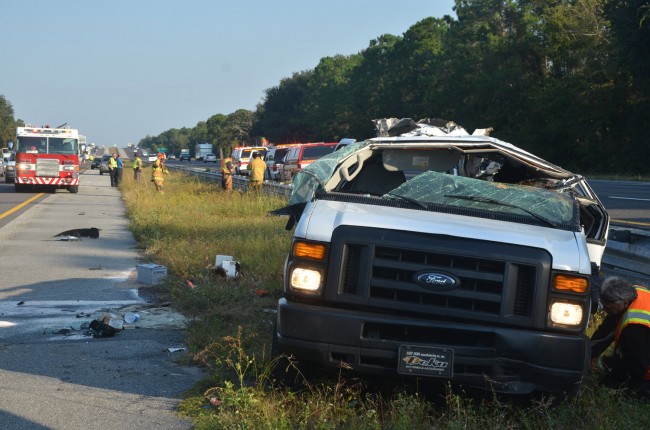
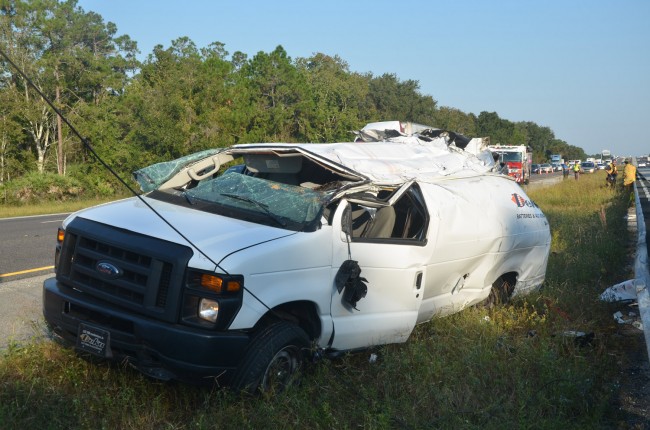
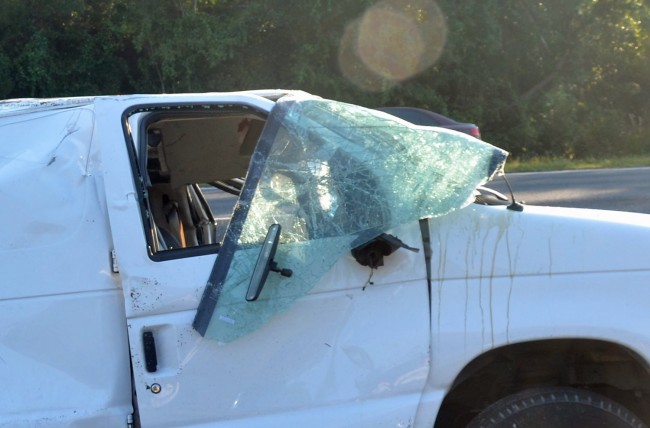
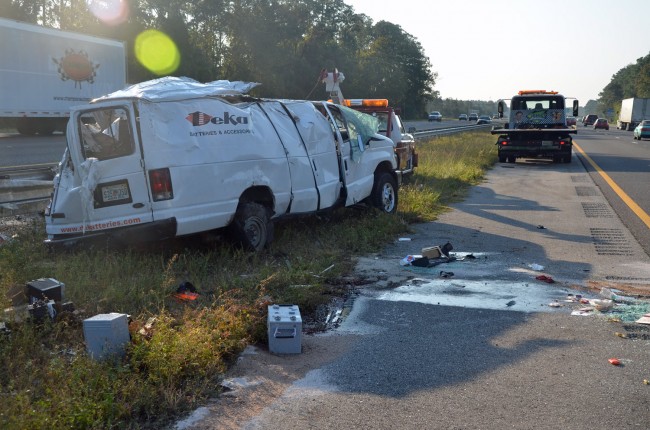
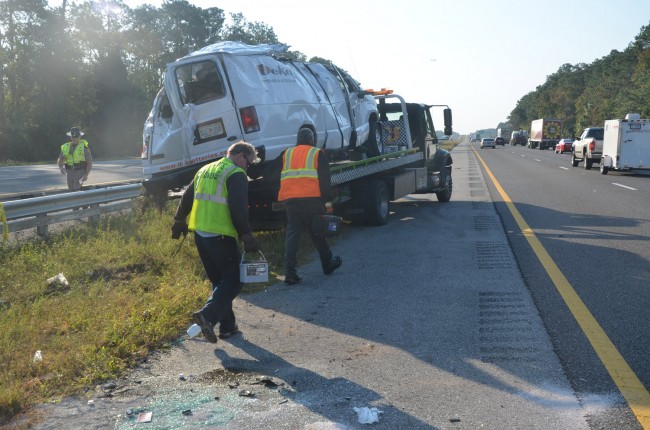
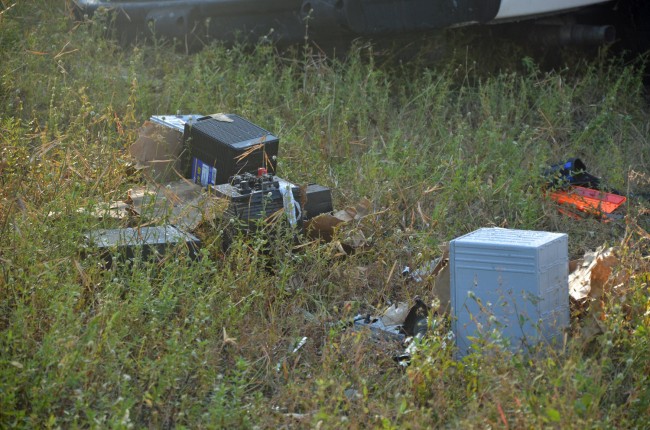
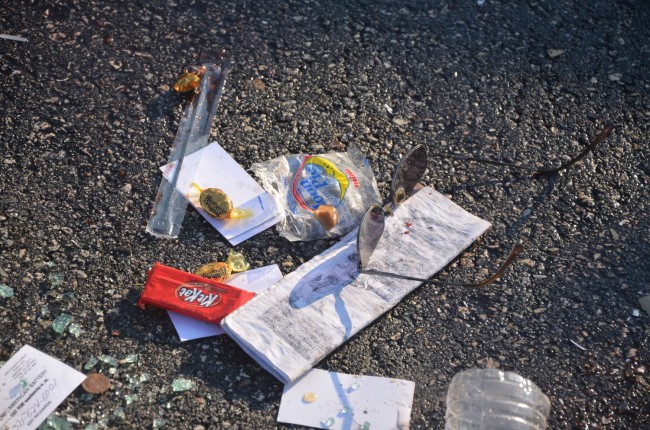





























Ben Dover says
Bet he was on his way to Sea Ray Boats or leaving there , this van used to come and deliver our marine batteries and pick up the ones that were defective . he`s a tip for people with extra batteries or if you happen to take yours out to work on your car , do not place battery on concrete driveway or garage floor , that drains your battery and damages the cells , put it on a piece of wood or thick cardboard , guys over in assembly would place them on the concrete no matter how many times you told them not too , and we`d be sending them back to the manufacturer with drained damaged cells , concrete is not good for the battery
John Boy says
If these batteries where for Sea ray then the Van was way overloaded, 8D batteries normally used in marine applications for larger boats made at Sea Ray typical weigh over 160 pounds each.which equates to 12,000 pounds (6 tons). Van may have had a weight capacity of 3,500 pounds at best. Know wonder the driver had a blow out especially at highway speeds which further compound the problem. Did the van also carry the appropriate corrosive plaques because of the acid contained in the batteries? Sounds like DOT better get involved.
Voice of Reason says
First off.. how about some concern for the driver and his family! Ben Dover and John Boy you are both wildly speculating. There is not one 8D (which do not weigh over 160lbs btw) in any of the pictures shown and the concrete vs battery issue is a myth for modern battery cases. Back when cases were made of wood then rubber and tar there could be potential situations that could cause those batteries to discharge/short, but that has not been an issue in many many decades. All batteries naturally self-discharge and if left sitting for periods of time without charging will not hold a load unless recharged. Concrete does not damage a battery unless it is dropped on the concrete… I would suggest some research for you both before posting nonsense. DOT 49CFR173.159 sub-section E
Ben Dover says
Voice of reason I know that Van delivered to Sea Ray , I unloaded it and loaded the one that didn t work back on , and as far as the concrete issue goes , you tell the Deka guy that , he`s the one that told us we can t put their batteries on concrete or they will drain and damage the cells , your speculating more then anyone , I was there !